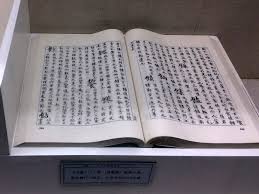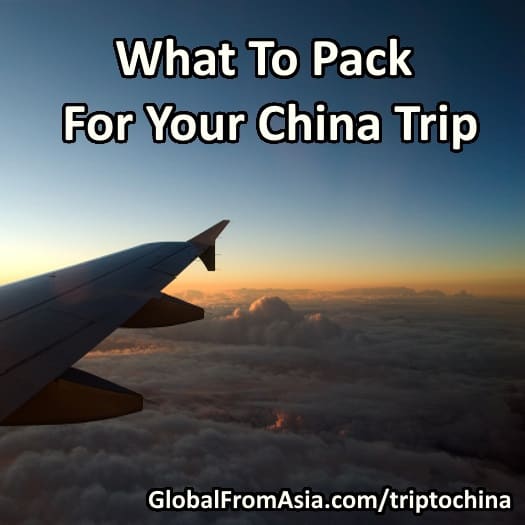This article is originally found at: https://www.globalfromasia.com/triptochina/

Planning your first trip to Asia or China and not sure what to put in that backpack?
As I write this, I am unpacking from my USA trip, arriving back to China a few hours ago, so I am just gonna go through what I brought with me!
Took years of figuring this out, and let me first tell you – less is more!
You don’t want to bog yourself down with too many small things that add up to an overweight backpack.
The China Trip Packing List

So I hope you give yourself a few days before your flight to pack. Some items may need you to print, apply online, and other items.
Or,
You’re like a lot of us and packing the night before the flight, after goodbye drinks with your hometown friends.
Well, if you’re reading this, you should be somewhat sober, let’s hope! Let’s dig into the list.
A Good Backpack
I’m not a fan of the roller bags. Having both of your hands free while traveling is a big help.
My friend Fred Perrotta has a product called Tortuga Backpack. I have been using it lately and it saves me money checking bags as it is the max size of a carry on, while also strapping to your back.
I’ve used the belt strap pocket to hold my passport for easy access during airplane check-in. And other times I need to grab my passport in last minute inquisitions.
I’ve also had it where I’ve had one backpack on my back, and another strapped to my chest. Nowadays the front pack is my baby, but that is another blog post ????
The key is to have a bag that allows you to use both hands while traveling.
A VPN For Online Surfing

I had no idea what a VPN was when I first traveled to China. But once the internet filtering got worse and worse in 2009, I had no choice but to learn.
Newcomers to China will soon find they cannot load Facebook, Twitter, and Google products. There is also a long list of other websites not accessible in China. The reason why, I don’t want to get into today, but the main point is – you need to access these right!
I am a fan of Astrill VPN (you can signup via my affiliate link here). They have somehow kept up with the ever changing Chinese firewall, and only had a couple days where it is slow or not working. I recommend getting the Stealth upgrade. I’m not exactly sure but it works better, and also lets me sync my Dropbox (yes, they block Dropbox too).
Whether you use Astrill or another, just make sure you get the VPN before coming to China! Sure, you can always find a way to get it while inside the great Chinese firewall, but better to have the tools ready to go upon arrival.
Cheap Nokia Phone And A Smartphone
Back in America, I could get by with just 1 phone. Here in Asia, almost all the various countries the average is like 2.3 phones per person. Crazy right?
Why?
First, you can’t port your number over from one mobile service provider to another. Thus people want to keep their old number but switch from say China mobile to China Unicom.
Others want to separate work and personal.
For you, you might want to keep your USA number on. The phone may also have a lock on it from the cell phone carrier you use, such as Verizon.
Another reason is theft. You’re going to be meeting a lot of new people and out and about a lot when you first land in China. Having a “cheap Nokia” or other phone as your Chinese number just helps you keep things simple when traveling.
For example when in Philippines, I have a cheap old Nokia for voice calls using their Smart carrier. For my internet, I have a Globe plan with unlimited surfing, and that is on my Android LG G3 phone. When I go to a restaurant, and people are calling me to coordinate meeting, I only need to answer with my Nokia phone. I’m not as paranoid attracting pick pockets.
There are a lot of use cases for having a cheap unlocked Nokia phone, so pick one up. Best to get it when you arrive in Hong Kong or China, at an electronics market. The cost is about 10 bucks. You can then buy a pre-paid SIM card, activate it, and you’re ready to rock!
Get a T-Mobile Plan Before Leaving USA

T-Mobile has been awesome for the past few years. They have plans that don’t need a contract, which is amazing for in-frequent America visitors like me. Then a couple years ago they went above and beyond allowing international roaming on their phone plans!
The calls are not free overseas, but the internet and text messaging is free. The speed might be slow, as you get the slower band or a “not as good” carrier in the country you’re in, but who cares! It is free and unlimited.
This is another reason why having 2 phones comes in handy. You can keep your USA phone on and use it for internet and texting friends back in America. While at the same time you use the Chinese Nokia phone for calling people in China.
Install Wechat Mobile App
In China nowadays all you need on your mobile phone is an app called Wechat. It is a chat app and more.
The main point is that everyone in China is on it, and it is more important than business cards. At networking events, if people want to keep in touch they scan each other’s QR code in Wechat and add each other. What’s your Wechat? Heard all the time, so by being set up and ready to go from the get-go is a huge help.
You can even start to connect with potential people in China before you move. Going onto Chinese social networks and finding people you’d want to connect with. The best way to keep in touch is to get their Wechat username. It is a closed system so you will not be able to find people in Wechat direct in searching. Instead on English speaking expat websites in the city you are targeting to move to is a good start.
Less “Stuff” = More

One big thing when I moved overseas is that I realized how much stuff we all accumulate. Free t-shirts at events, new clothes for various dress codes. After a couple trips to Wal-Marts (ones in China are massive, and can be an adventure in themselves!) and you’ll have so much stuff it is hard to move!
Less is more. With today’s sharing economy, there will be more networks where you can rent “stuff” that you’d accumulate.
I recommend having standard “uniform” of clothes that you wear on a regular basis. Three to four sets of the same tops and bottoms, to make life so much easier.
Extreme you say? Well, you don’t have to have the exact same sets of clothes, but by not focusing on fashion you will be set free!
Multiple Wallets
Wallets can get out of hand. Especially for those who travel across borders often. Moving to China, you will still keep your USD and credit cards I assume? The question is, do you mix that with your new China financials?
The best way I have sorted through this is to keep multiple wallets. That way I don’t mix up my cash and cards. I put them in a safe place in my apartment, and when I am preparing to travel I grab the wallets I will need during these trips.
SIM cards can go inside too, as well as any special travel documents you use on the road.
Before keeping multiple wallets, I would switch out the cash and cards and put them into a plastic bag or box. But then I would misplace that and dig through all sorts of places until I remembered where I put it. Having dedicated places for your important currency and cards keeps my mind at ease.
Photocopy of Your Passport

While in China, we need to keep our passports on us at all times. Sure, I know who does that?
Well, if you ever do get into an incident – the first thing the Chinese police will ask is for a copy of your passport. If you don’t have one on you, it can become an issue. Though I can say when I had my laptop bag stolen, I reported it to the police and they didn’t require me to have a passport. Some other friends I have talked to that had police officers drive them back to their apartments to get their passport.
Still, the best way is to keep a photocopy with you. This way the police or other government officials who require it in your day to day can see something.
Don’t like to hold paper on you? Sure, another idea is to have a digital copy on your mobile phone. Or synced on your Dropbox account, you can access it when someone asks.
Especially as a newcomer to China, you will be needing your identification a lot. From apartment contracts, banking, and job opportunities, they’ll always ask for it. Best to have a few ways to access your ID on demand.
Chinese Visa
Flying to China and don’t have a visa? Probably not possible, these days when you check into your flight the attendant will check your passport. Almost all passport holders need to have a visa to enter China, even us Americans.
There used to be easier ways to get a visa upon arrival, but nowadays it is best to apply while still in your home country. Are you coming as a tourist or to do business? I suggest playing it safe and paying a bit more for a business class visa.
Once you get it, like your passport, keep a photograph and scanned copy of this China visa. They’ll stick it to a page in your passport. Sometimes companies will want to see your visa when applying to things online. So it is much faster to have it already scanned and in digital form when sending in the documents. I still struggle to this day to scan things while on the road.
Bonus: APEC Card
This is a bonus one, but you will be on a whole new level compared to your other foreign friends in China. Holding an APEC card you can get the full guide here.
Medical Card

What is your blood type? Any allergies?
I want to call this one your “dog tag”. A dog tag comes from military days when soldiers had to hold metal tags as a necklace. It contained their personal information and blood type.
I’d also recommend keeping this card in English and Chinese. It’s always better to be safe than sorry. Store it in your wallet or inside your passport and with your passport copy. Laminate it.
Here is the information I recommend
Name:
Date of Birth:
Emergency contact person: (name / phone / relationship)
Blood Type:
Allergies:
Remember, in both English and Chinese.
Let’s put this in perspective. You land in China, you’re enjoying a nice meal. You get ill and pass out. You’re deep in Central China and no one else speaks English. They call an ambulance, and check for your identification on you. They see this laminated card in English and Chinese and know a lot about you, in their Chinese language. The medics are confident not to give you medicine you may be allergic to. You get a blood transfusion with the correct blood type. They contact your mom back in USA with the contact information on you.
Let’s try not to compare that to someone with no ID and all alone in a Chinese rural town.
Sure, you shouldn’t travel by yourself. You can also picture a time you get split up from your friends, lost on a subway, or drunk and wandered off on a pub crawl.
So let’s be smart and keep this kind of medical information on us to make life safer.
Insurance Back Home Covering You?

While on the topic of medical, it is also a good idea to make sure that you let your insurance provider know you’re traveling overseas. Or at least make sure you’re covered while on the road.
Most insurance policies should cover this. But by being proactive and aware of it you will feel much more confident traveling overseas. It also may remind you to have a copy of your insurance policy in electronic format (or print even better) for your travels.
Don’t have insurance? You can pay in cash in China, and of course they prefer that. Minor medical issues are not too expensive, though many of my friends can’t imagine going to a hospital in Mainland China. Hong Kong is much more Westernized. But so are the prices! So I would recommend having insurance if seeking medical attention in HK.
Check our blog post on medical insurance in Hong Kong and China for more info.
Tell Your Banks You’re Traveling Overseas
Here is a horror story for ya. It was my first time in Hong Kong, and maybe my second or third day. I put my Bank of America ATM card into a China Construction ATM and input my PIN. I received a popup that they “ate” my card and to contact my bank.
Horrified, I thought what can I do? It was during banking business hours, so I walked into the branch and waited to speak to a representative. She explained that they cannot access the ATM, and that they would mail the card back to my bank address in America.
What?!?
I rushed back to my friend’s home where I was staying. Hopping onto the internet I contacted Bank of America via chat support. They explained that my card had recently expired and they would mail me a new one. To my USA address! I had couple more weeks in Asia, what could I do?
That is what good friends are for, I was lent money to cover me a couple days, and then had money sent to their bank by bank transfer. And credit cards helped as well for most of the trip.
Scary right?
I have heard other stories similar, and bankers tell me that it’s best to check up on your bank before traveling. They are getting more and more fraud protection in place. They may freeze your account, at least a temporary hold, if they see overseas activity.
So just spend the few minutes – let’s hope not hours on hold – with your bank’s customer service. You will feel more at ease that first trip to an ATM overseas.
Layered Clothing

Predicting the weather seems something even full-time Meteorologists have trouble doing. Hong Kong and South China is always hot, but there are times you’ll need a light jacket, or maybe medium level.
To best deal with the various weather outlooks, I suggest packing so that you can layer up your clothes. Having an undershirt, normal shirt, and then sweatshirt or hoodie helps a lot.
You might have your own style of fashion that is “high maintenance” and may skip over this section thinking I’m crazy. You’ll learn, :). I’ve seen a lot of long term travelers who started out with lugging around their full wardrobe. Yet over time have chosen travel light over carrying clothes.
What will the decision be for you?
So I’ll finish this section off with, stick with your current clothing style. But if you need a shipping container to move from one place to another, it may be hard to have a life of a traveler. It’s a process, so enjoy the journey.
Water Bottle
Attending trade shows in China, you will see rows and rows of factories that make water bottles and tea containers. The first time I seen this I thought “who buys all these?”.
I’m now a happy customer of a wide assortment of water bottles and tea containers. Staying hydrated while traveling is key to staying healthy. Whether you travel to China or not.
The difference with China (and other parts of Asia) from the West is the fact you can’t drink the tap water. Restaurants will serve hot water or tea, never ice water. There aren’t any public water fountains on your trip. So you’re left with buying bottled water (or, juices and sodas which aren’t helpful for hydration) or carrying your own around.
Started out with friends donating them before I took the hint. Filling up from a larger water machine before leaving your apartment or a hotel to start your day will at least force you to consume that much liquid.
What seems like a simple item on this checklist is important. I also have it clipped onto my backpack so that I can keep my hands free. The clip also helps you to remember to take it when you trek from place to place throughout the day.
Items For Offline Blocks

While we are in 2015, there still isn’t widespread wifi in public transportation areas. We need to deal with it by preparing with things to keep our minds busy during those long flights and phases when we cannot access the internet.
We wrote up a full article on offline tools so if you want to do a deep dive on check it out. Here is a short list:
I’m sure you’ll think of your own tools and tricks to stay occupied when without internet. For me, I don’t like the fact that I don’t have internet control if I can be productive or not. I love to control my work productivity, internet or not.
Chinese Apps for Language & Travel Help
We live and die by the smartphone these days. It is the modern equipment of a road warrior and traveler. So leverage this power!
Here are some apps that help me get by in China:
-

Chinese Dictionary
At first I thought there was no way I could read Chinese. Slowly but surely now I’m up to over 500 characters and growing daily. While it may seem daunting and you’re just in China for a short term trip (so you think!) – you should still prepare and have a Chinese dictionary on your phone. I’m a partner in one choice, Written Chinese’s WCC dictionary is almost completely free and also has OCR functionality so you can scan and translate signs in China on demand.
-

Wechat
Has its own dedicated section earlier in the article. Still, to re-iterate, there is no getting around using this app if you live in or do business with China. Download Wechat
-

Skype
Most Chinese factories and business owners who deal with international business will know it and have an account. Consider having a separate account for business and personal. Get Skype
-

Spaxtel
An easy and low cost way to make international calls, when the Chinese internet sucks (as it often does). Full disclosure, my friend is a founder here, but I am not compensated to recommend this one. Check out Spaxtel here.
There are tons of other apps too, which you will hear about from friends and colleagues once you get into China.
**Tip** – I recommend downloading and installing these apps while still overseas. Especially if you are an Android user, as Google Play is banned here and it is a lot of hassle to get these apps downloaded inside of Chinese internet. Apple’s App store isn’t blocked, but it is much slower and may test your patience.
Bag Packed? Ready to Go!

So you ready to rock your China trip? Is your bag bursting at the seams? Most of the time many of us realize we have over packed and wished we traveled lighter.
Don’t stress if you forgot something, almost anything is in China! This is most likely where they made it!
Have I missed anything, I’d love to hear your feedback and suggestions in the comments below.
Download my China Packing List
Want to have the full list with you when on the road? I have a nice PDF list of items you can download and put on your computer. Bookmarking this page is also helpful – but as we all know – we may not have internet when we most need it!


